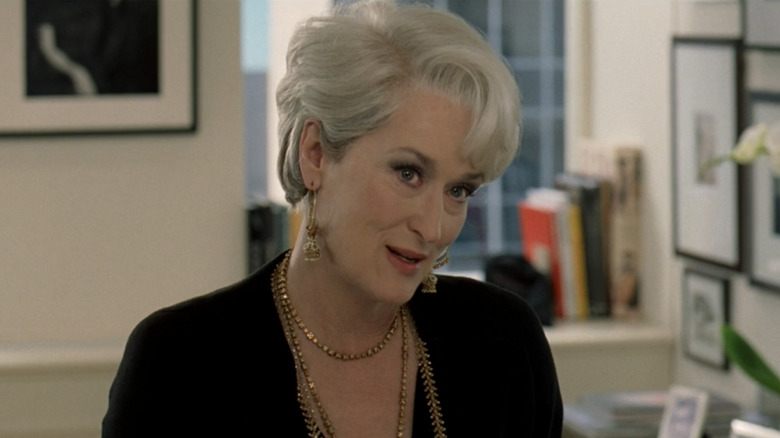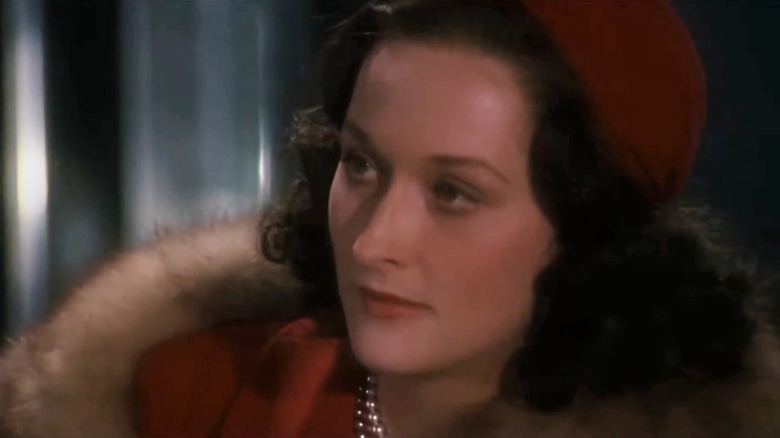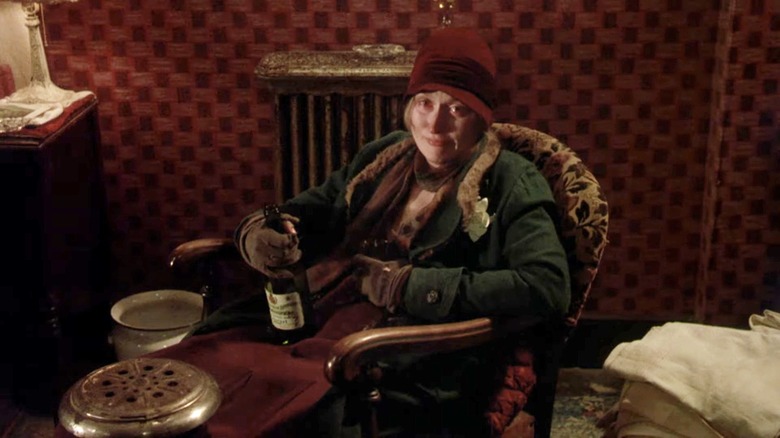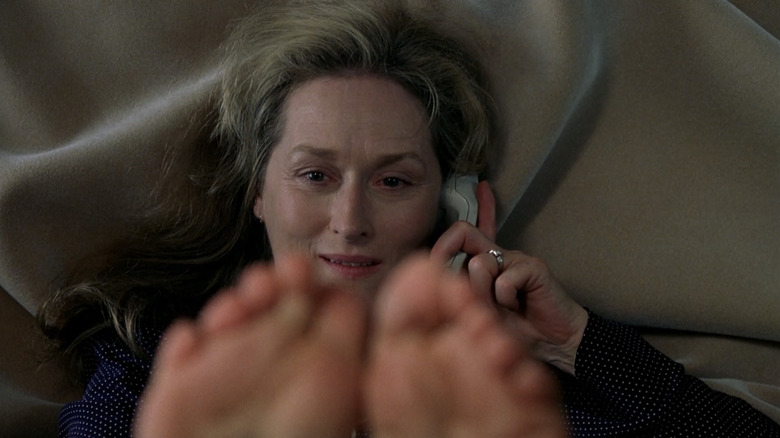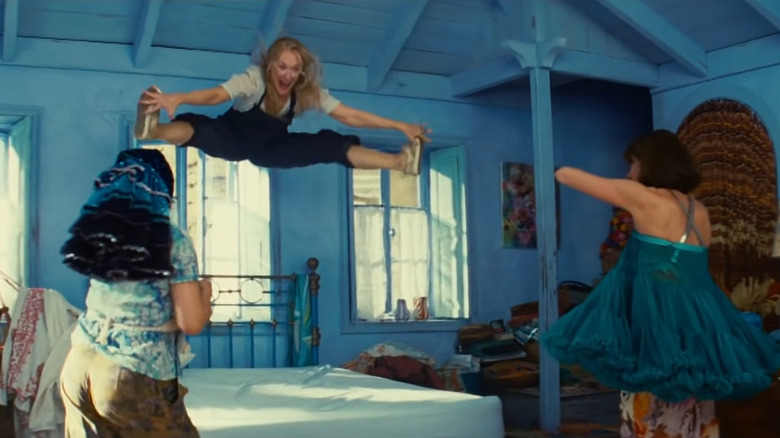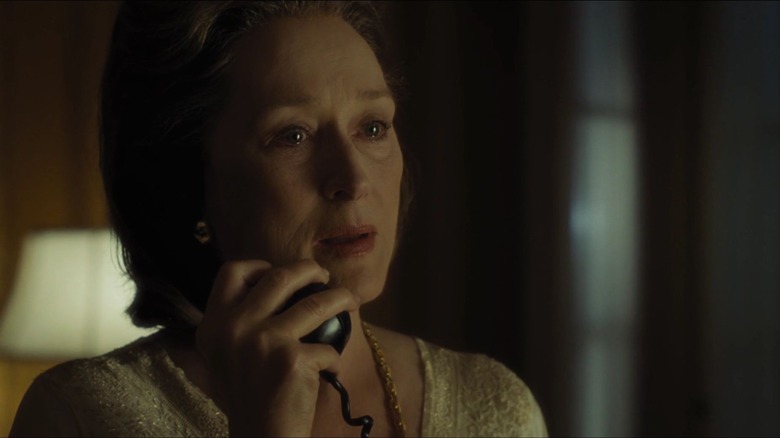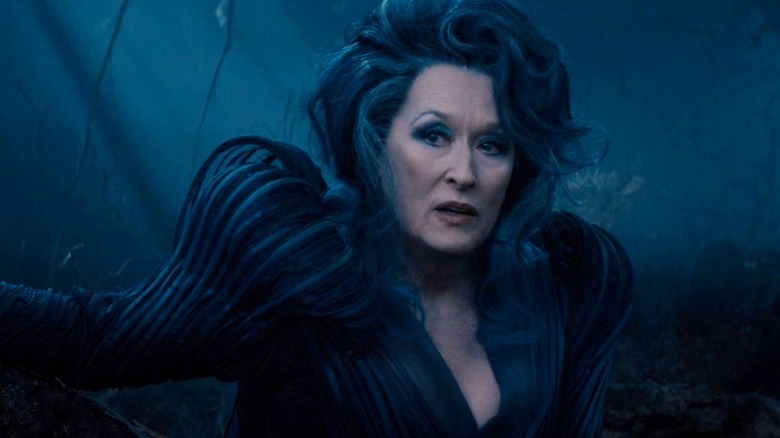Meryl Streep Never Thought She Would Be A Working Actor Past 40
Meryl Streep has 21 Academy Award nominations. That's the most among actors of any gender, and it's not even close. Jack Nicholson and Katharine Hepburn are the two closest to her, and they only have a dozen each. In terms of actors who are actively working (as Nicholson is retired and Hepburn no longer with us), Denzel Washington and Al Pacino are next in line, and they don't even crack double digits. Meryl Streep is in a class of her own.
She has earned this reputation of being synonymous with great acting for a very good reason: she is that good. The breadth and complexities of the characters she has played on film, stretches back to her earliest performances in the 1970s like "The Deer Hunter" and "Kramer vs. Kramer." You can call on Meryl if you want someone to play an emotionally tortured character, or the most fun person you've ever met. What you can't forget, though, is that Meryl Streep is a woman. And the movie business is not kind to women, particularly women who have lived past their 30s.
Hollywood is filled with stories of discarded female performers. Once they no longer seem desirable to the men in charge, they stop getting cast in lead roles and either have to settle for supporting roles, like "mother to the main character" or "scary witch," or be content with finding a new path in life. Very few female actors have been able to continue on headlining pictures into their later years, and that is a great shame. Even with all the acclaim and awards, Meryl Streep thought her career as a leading lady would be over by 40.
'Hags and witches'
The first film Meryl Streep ever appeared in was Fred Zinnemann's "Julia." When that picture was released, she was 28 years old, a somewhat late start for someone to getting into movies. She missed out on that fresh-faced ingenue phase so many young women go through in Hollywood, oftentimes launched into the spotlight because of their beauty. Streep was a theatre actor who got a small part in a Holocaust drama. After this she very quickly started getting great parts, which led to her becoming an above-the-title star.
When you reach a certain strata in Hollywood as a woman, the crash back down is sadly almost inevitable. Speaking with Variety back in 2016, Streep expressed her belief that she thought her days as a major working actor were numbered:
"I always felt that my career was over starting at 38 years of age. I'm 66 now. Every year after that, I'd always say, I'd better take this because, you know. ... In those days I had no reason to imagine that I would have a career past 40. You could work up to 40 and then you'd start playing hags and witches."
This fate is all too familiar for women in film. Bette Midler was just 47 in "Hocus Pocus." Anjelica Huston was exactly 38 years old when she starred in "The Witches," as was Angelina Jolie in "Maleficent." Go all the way back to Margaret Hamilton as the Wicked Witch of the West in "The Wizard of Oz" — she was only 36. The second you no longer fulfill the prurient desires of the men in charge, you will be replaced. Meryl had every right to think this would happen to her. But it didn't.
The 40-year-old pivot
So, what happened when Meryl Streep turned 38? She got nominated for another Oscar. This was for the film "Ironweed," in which she starred alongside the also-nominated Jack Nicholson. Then she turned 39 ... and got another Oscar nomination for her performance in "Evil Angels" (released as "A Cry in the Dark" in the US), which you probably know as the "dingo took my baby!" movie.
Once she got past 40, her career wasn't over by any means, but it did pivot. Up until this point, Streep had become tied to heart wrenching dramas. She was probably doing some kind of an accent, and a lot of tears were involved. This was her bread and butter, and in the spirit of taking what came across her desk for fear of not getting hired, she decided to turn to comedy.
"She-Devil," "Defending Your Life," and "Death Becomes Her" were how she was going to evolve her career into her 40s. These were good parts, but the reception for them wasn't exactly what you'd hope for. Even if these movies were tremendous (and a couple of them are) the knock on them would always be that Meryl Streep wasn't funny. People couldn't take this woman who was a tear generator for over a decade in a funny context. We can look back now and see that was silly, as she was just as riveting in these comedies as in dramas, but at the time, this wasn't the case.
After a few years, she went back over to the dramas and started getting Oscar nominations again for pictures like "The Bridges of Madison County." Still, she managed to avoid all the pitfalls of an aging female actor. Leading roles in big films — and no witches.
Learning to love fun Meryl
Meryl Streep may have gone back to her usual lane, but the fervor around her movies was not nearly as significant as it was in the late 1970s and '80s. No one could deny her performances, but no one was fully embracing the films either. Then 2002 happened. One the one hand, she starred in "The Hours," the Best Picture-nominated drama that won Nicole Kidman her Oscar. Out of the three leads of the film, which also included Julianne Moore, Streep was the one who didn't get nominated, but that is because she was busy getting nominated for the Charlie Kaufman-penned, Spike Jonze-directed meta-comedy "Adaptation."
Streep's first foray into comedy was met with much resistance. But here, she was in a prestigious, high-minded comedy. The shackles of her being synonymous with a certain kind of movie were not nearly as tight because "Adaptation" was a film that could bridge that gap. She could play a goofy scene like her being incredibly high as she talks on the phone to Chris Cooper's character, and people could connect to the comedy of it without being confused as to why Meryl Streep was the one doing this.
She carried this momentum over to a little picture called "The Devil Wears Prada." This was a 57 year-old woman headlining a major studio film, giving a bombastic comedic performance that also mixes in a good amount of pathos, and the picture made over $100 million at the box office, which hadn't happened in her career before as a first-billed actor. Nearly 20 years after she thought her career might be over because of her age, Streep managed to become one of our most reliable movie stars.
A latter years box office star
"The Devil Wears Prada" marked a significant shift in how we perceive Meryl Streep as a performer. Prior to that film, she had always been someone you relied upon for awards consideration, not box office. She could always get good parts because the budgets were not massive, and there was still an audience for adult-minded dramas in the 20th century. As a talent, producers could always bank on Streep giving a picture just a bit of prestige and a minor bump in the culture.
When we start getting to the mid-2000s and 2010s, the idea of movie stars selling movies becomes less and less scarce. How many people under the age of 38 nowadays could you put their name and face on a poster, and that alone would guarantee at least $100 million gross? Not many. The ones who could still do that were in their 40s, 50s, and 60s, because they had been grandfathered in from a time where movie stars did have that kind of marketing power. As Meryl Streep was basically the only woman who never stopped getting lead roles, she could use that reputation and clout to come in as a legacy movie star.
She could star in a fluffy light musical like "Mamma Mia!" and see it make over $600 million worldwide, unheard of for a film starring a woman in her 50s. The year she turned 60, she had both "Julie & Julia" and "It's Complicated." Both were tremendous hits, and she got an Oscar nomination for the former. Meryl Streep was no longer just a well-respected actor. She was money in the bank; a brand unto herself.
Defying the odds
Very few women have enjoyed the longevity of success that Meryl Streep has had in Hollywood. It is not because they aren't as talented, as committed, or as driven as Meryl. It's because the opportunities afforded them are so incredibly narrow. The average lifespan for a leading man lasts so much longer than for a leading lady. This is how we get inundated with movies with 50 year-old guys getting romantically paired with 27 year-old women. There's this belief that the gruffer a man gets, the more appealing he is, but if a woman ages, she just becomes haggard and unappealing. It's Misogyny 101.
The roles for young women are typically not very wide-ranging either, and many of them are parts that exist so a director can photograph their beauty. Whether she was aware of it or not, Meryl never really went for the movies that linked her worth to her appearance. Her breakout, Oscar-winning performance was playing a woman who walks out on her kids in "Kramer vs. Kramer." That rarely gets to happen with a young female actor. She never really had a persona. She was an actor, which is how anyone in this business should be seen to begin with.
It's a shame that Meryl Streep's career has to be an anomaly and not something that many actresses get to experience. I'm sure there are plenty of women who are quite happy with how their careers in the film business turned out, but I imagine many of them were led down the path of playing motherly saints and gaunt crones purely by circumstance.
A witch is fine if it's Sondheim
Meryl Streep did eventually play a witch, but it was not when she was 38. No, she was in her mid-60s by the time she had to do that. I say "had to," but I don't really mean that she was forced into it. She starred as The Witch in the lackluster adaptation of ones of Stephen Sondheim and James Lapine's musical masterpieces, "Into the Woods."
This is one of the most revered works to ever grace a Broadway stage, and is beloved by countless amounts of people. This was not playing a witch because it was the only part she could get because of her age; this was tackling one of the most sought after parts in the musical theater canon. Who would turn down the chance to perform the song "Last Midnight?" No one.
Patina Miller currently plays the part on Broadway. She is 37.
